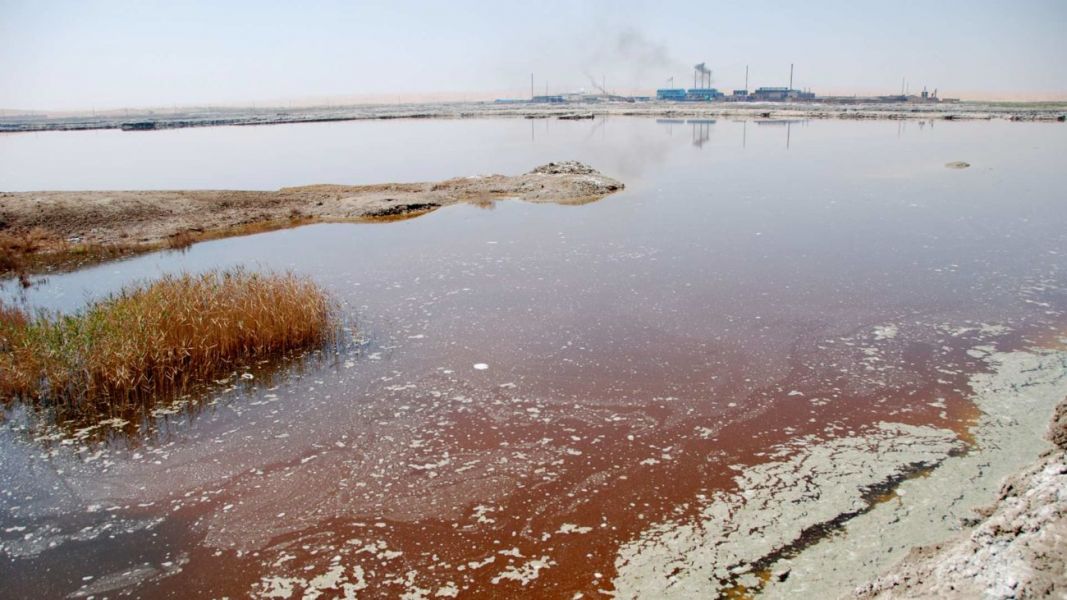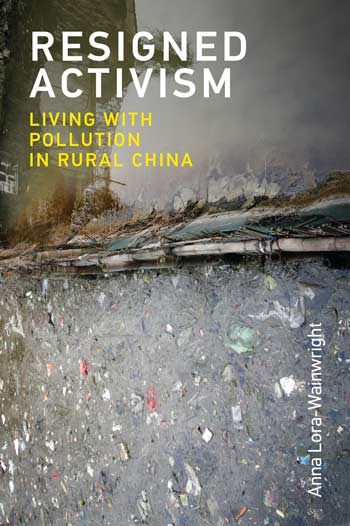
Resigned Activism: A Conversation with Anna Lora-Wainwright
In today’s China, rapid development and urbanisation has resulted in widespread environmental pollution and degradation. In many parts of the country contamination has become a mundane but oppressive part of daily existence. In Resigned Activism (MIT Press 2017), Anna Lora-Wainwright examines how Chinese people living with environmental degradation attempt to improve their situations in ways that are infused with deep resignation and feelings of powerlessness.
Andrea E. Pia: China’s experience with bottom-up mobilisation against pollution and in support of a cleaner environment has been one of immediate repression first, and of instrumental assimilation later. Accordingly, today’s environmental question of how to decouple economic growth from the exhaustion of irreplaceable natural resources has ultimately gone mainstream in China. While mentions of widely praised documentaries and films such as Wang Jiuliang’s Plastic China (2016) or Zhao Liang’s Behemoth (2015) have, more or less, been wiped off the Chinese Internet, the government is now taking strong environmental action, such as enacting an outright ban of imported plastic in the country. And yet, little seems to have changed for those whose lives are inextricably entangled with pollution. Drawing on fieldwork carried out over a five-year period in various communities in central, south, and southwest China affected by pollution, and in collaboration with different Chinese research institutions and NGOs, your book raises the uncomfortable question of what role resignation plays in China’s environmental politics. Why do you think it is important to take the perspective of ‘resigned activism’ to understand China’s current environmental predicaments?

Anna Lora-Wainwright: Although, as a fan on Pierre Bourdieu’s work, I have long been interested in processes of social reproduction, I never actually set out to research resignation. My original goal was to compensate for the lack of scholarly and media attention on environmental consciousness and forms of agency among relatively marginalised communities in rural China. Having spent almost two years living in a village in Sichuan for my first book project, Fighting for Breath (which is about the ways in which villagers cope with cancer) it bothered me that there has been so much focus on the middle classes as environmental actors while rural communities have been essentially ignored. I wanted to show that these communities also care about pollution and that they could play an important role in environmental protection. As any anthropologist should do, however, I had to revise my conceptual focus and my argument to be faithful to fieldwork findings. The research I conducted in Yunnan with Yiyun Zhang, Yunmei Wu, Qiliang Wang, and Benjamin Van Rooij was particularly foundational in shaping my analysis. Similar attitudes emerged during collaborative research in Hunan with Jixia Lu—this was part of a larger project involving several colleagues at the Chinese Academy of Sciences and other institutes, and was supported by FORHEAD, the Forum on Health, Environment and Development—and in Guangdong with Liping Li, convincing me of the value of comparing analytically across these cases. Indeed, the villagers I encountered during these collaborative projects seemed concerned about the effects of pollution on their crops, water, air, and their own bodies. They had on occasion embarked on low-level activism, including petitions to county governments, blockades, and direct liaising with polluting firms. But even when they did, their accounts were coloured with a pervasive sense that nothing much can be changed, that they are relatively powerless, and that their voices consistently go unheard. For me the term ‘resigned activism’ is a way to draw attention to these co-existing realities.
Why is this important for China’s environmental predicaments? For three main reasons. The first is that there is a lot more concern with, and awareness of, pollution among even relatively disempowered communities than is typically acknowledged, and this may well escalate should a drastic event occur or an opportunity arise. Resignation, in other words, may be a fertile ground for future collective action as much as it may be a mechanism for maintaining the status quo. The second is that for citizens to be truly involved in the type of public participation envisioned by advocates and activists, they need to feel that their experiences and their plights count for more than they currently do. It is painful enough to live in a polluted environment, but engaging in time-consuming and futile activism can be completely demoralising. Third, communities’ and individuals’ entanglements with pollution are often rather complex, and may involve direct or indirect economic dependence on polluting activities. Faced with the need to meet ever-growing living costs, as well as the steep costs of healthcare and education, residents of polluted areas may feel unable to demand a cleaner environment if this may entail the loss of livelihood opportunities.
AEP: To middle-class, urban-minded environmental activists outside of China, who have no experience of political mobilisation in an authoritarian regime, the argument contained in your book may reinforce the implicit orientalist assumption that Chinese citizens are victims of their own ‘eating bitterness’ mentality—that is, deep-rooted meekness inhibiting truly adversarial forms of environmental activism. But your account of habituation to pollution shows how carrying on amid life-disabling environmental hazards requires anything but passivity. You interestingly suggest that what we see in rural China is the substitution of the collective with the familial. The activism of your research participants is spent more on protecting individual families than the environment they share. To what extent do you think is it possible to reclaim these energies for the sake of a broad-based people’s environmentalism in China?
ALW: First of all, I do not think labelling villagers as individualistic or as powerless victims helps us to understand the complex realities they face and the ways in which they navigate them. Much of the argument in the book and in other publications with colleagues involved in the Yunnan and Hunan case studies opposes this superficial reading of reality. Low-level efforts to fight pollution are sometimes characterised disparagingly as NIMBY (‘not in my backyard’) or individualistic. But these may just be relatively resigned moments in a much longer and more tortuous engagement with pollution—moments when there seem to be no other option but to protect oneself and one’s immediate family.
Conversely, villagers try to reclaim agency in ways that may not be immediately apparent, or may even seem counterproductive. For instance, people’s decision to take on potentially harmful jobs or to bear polluted environments requires agency, even though we may not describe it as a choice, strictly speaking. Many villagers I encountered viewed living with pollution as a necessity (the expression ‘mei banfa’—literally, ‘there is no way’—was an extremely common response to questions about how they cope with pollution) or a trick of fate (a sense that pollution was an inevitable part of development). These decisions are also part of a delicate balancing act that those who live with pollution have to engage with in their everyday lives, and which affects their attitude towards activism.
Most importantly, my emphasis on the term ‘resigned activism’ is not to suggest that we should only look at resignation. What I argue is that in order to understand activism anywhere, we need to also pay attention to resignation, and that these two forms of engagement are not mutually exclusive, especially if we look at activism in any given locality across a longer period of time. Neither communities nor individuals are constantly active in the conventional sense. Indeed, being politically active requires considerable energy, organisation, social cohesion, and a certain amount of agreement among a group of people about what the problem is and what may be the solution. But even during times when no visible signs of activism are apparent, communities and individuals affected by pollution are busy making sense of their environment, facing the challenge of how to make life livable and relatively healthy for themselves and their families. These efforts, which in and of themselves may not count as activism, are nevertheless a crucial background for the development of more conventional forms of action. Conversely, when political engagement, for instance through petitions, fails to bring the hoped for results, this may well reinforce a deep-seated sense of resignation and it may inform locals’ expectations for what a healthy environment may be and what they are entitled to demand.
In my experience, people focussing on the protection of themselves and their families does not necessarily hinder collective action. To the contrary, maintaining a concern for pollution at the individual and family level is a precondition for a broader environmentalism. I think what inhibits a broader environmental movement is not resignation and fatalism. Nor is it individualism—I am not a fan of the term, and I do not think it describes adequately nuanced realities in rural China. It is rather the converse: the current political impossibility of a broad environmental movement that may even remotely challenge the Party’s authority, is an important part of the reason why resignation emerges so frequently. The fact that the very top leadership in China is now advocating more and more attention to environmental protection—creating a ‘beautiful China’ (meili zhongguo) and building an ‘ecological civilisation’ (shengtai wenming)—also sends a strong signal that the Party-state is acting to protect the environment, effectively reclaiming the terms of the debate away from communities.
More broadly, I do not believe the processes of habituation and normalisation that I describe are only taking place in China. Trying to make our surroundings bearable and intelligible is an essential part of the human condition. There is plenty of evidence from other studies of heavily polluted regions in the United States for instance to suggest that pollution gradually becomes a normal part of life.
AEP: You link China’s environmental predicaments to the prospects of systemic change, demonstrating that challenges to China’s complex governance machine often get metabolised in a way that makes the system more resilient. This seems to suggest that the way in which the Chinese Communist Party keeps its place in society is by feeding off its own crises, which are themselves reflections of the contradictions inherent in capitalism. Do you think it is still possible to write about pollution and environmental degradation today without mentioning supernational forces like capitalism?
ALW: Environmental degradation is certainly tied up in more complex dynamics that transcend nations. Environmental impacts travel. Conversely, the causes of degradation cannot be explained only on a national level. The global economic system of production and trade means that some areas emerge as local sacrifice zones, which bear the uneven burden of the global thirst for resources and conspicuous consumption. We should always remember this before pointing the finger at the Chinese government for the environmental disasters—slow and acute—unfolding within its borders. At the same time, there are also very local reasons why environmental degradation affects certain places rather than others. For instance, localities which are poorer and keen to catch up with their wealthier neighbours may forego environmental protection in order to attract investors. So the ways in which pollution affects given places are a combination of local and global dynamics.
AEP: In your book you describe forms of water stewardship that are constantly frustrated by a political context which denies communities the very capacity to offer and effect radical change. As scholars/activists, what do you think our role should be in shaping future environmental politics, in China and elsewhere?
ALW: My involvement in interdisciplinary projects has taught me how complex it is to affect change, to design interventions that may be feasible in the long term and to do so together with the local population, without whose support no intervention would ever be sustainable.
There have been countless times when, being faced with individuals, particularly children, affected by pollution I felt frustrated by my inability to ‘help’. But what does it mean to help? Drawing on powerful connections (if we have them) to shame local officials or expose local pollution nationally or internationally? Who will this help in the long run? What will it change? I think as scholars and as activists we need to learn to choose our battles, our allies, and our targets carefully, and to be patient in identifying the most productive ways forward. But above all, our role should be to produce better understandings of the complexities at hand, to engage with the communities affected in an inclusive and open-minded manner, being mindful of the conflicts and contradictions we may encounter. Beyond China, when it comes to protecting the environment, I believe we all need to reflect on our individual responsibilities and serve as public intellectuals to encourage others to do the same. But just as importantly, we need to lobby governments and corporations to take more responsibility for environmental protection too.
Ultimately, only with better knowledge of the interconnected problems we face as individuals, families, communities, nations, and as a planet, can there be more effective action to tackle these problems.





